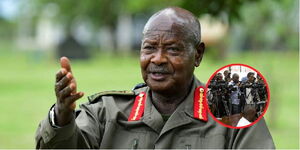Former Police Spokesperson Charles Owino has elaborated on the conditions under which police officers can justify using lethal force during protests.
Addressing the complexities of maintaining law and order, Owino emphasized the need for both discipline and accountability on the part of the police and protesters.
"There are circumstances when the police can justify using lethal force. Let's be honest with young people," Owino stated, underscoring the importance of transparency in discussions about law enforcement.
Speaking on Citizen TV, Owino pointed out that ensuring discipline from both sides is crucial for safety and order.
"We need to ensure discipline from both the police and protestors. How can police officers provide protection if there is no fear that they can use bullets?" the former police spokesperson posed.
Owino clarified that his intent was not to defend police actions indiscriminately but to promote peaceful demonstrations.
"I'm not here to defend the police, but we must be peaceful during demos. Why destroy someone’s property?" he questioned, highlighting the destructive behaviour seen in some protests where demonstrators resorted to looting and vandalism.
He called for civilian oversight to hold officers accountable for inappropriate actions.
"We want civilian oversight of officers so those who act inappropriately can be held accountable," he asserted, indicating support for mechanisms that ensure police actions are scrutinized and justifiable.
Reflecting on the recent Gen Z protests that began on June 18th, Owino noted that no lives were lost, signalling a shift in police tactics.
"No lives were lost when the Gen Z protests began on 18th June. The police are not using outdated ways of dealing with protestors," he remarked.
However, Owino also acknowledged the potential for overreach by law enforcement, indicating that while the police are tasked with public safety, there is a need for restraint.
"The police have a role in maintaining law and order, but they might become overzealous," he said.
Explaining the professional constraints of the police, the former spokesperson explained that the men in uniform are not allowed to protest because the constitution limits them.
"There are limits to rights. Police officers are not allowed to participate in demonstrations; they cannot go to the streets to complain about their welfare, even when they feel they are not well paid," Owino explained.
The National Police Service and its leadership have been under fire for abducting, maiming and killing protesters in Nairobi and other parts of the country.












